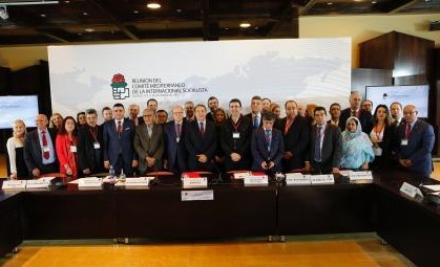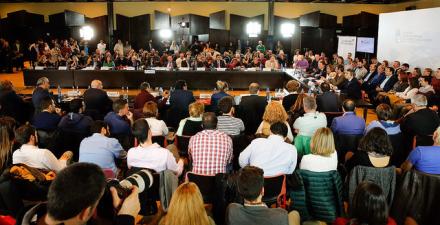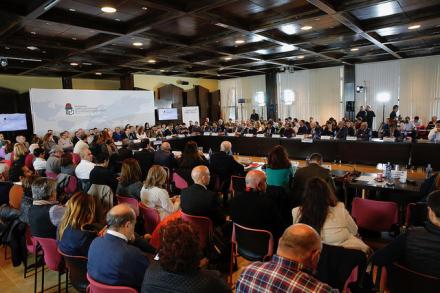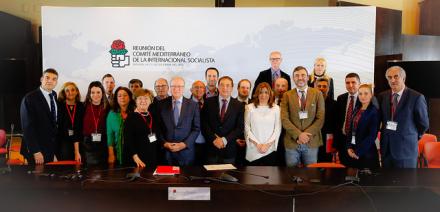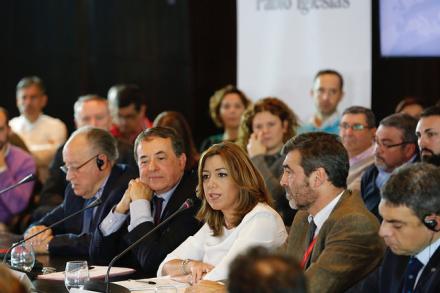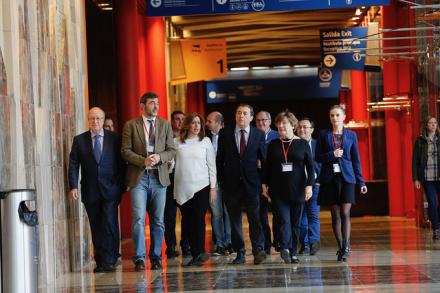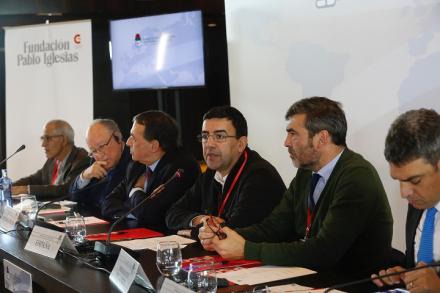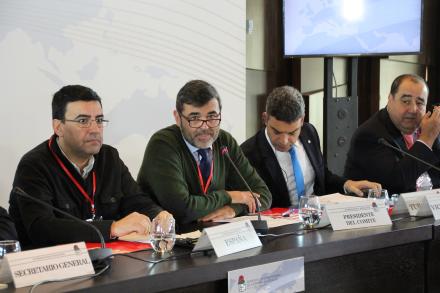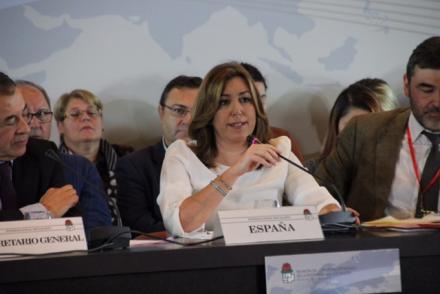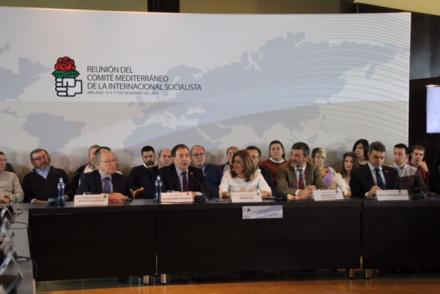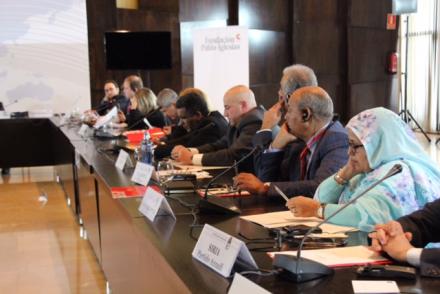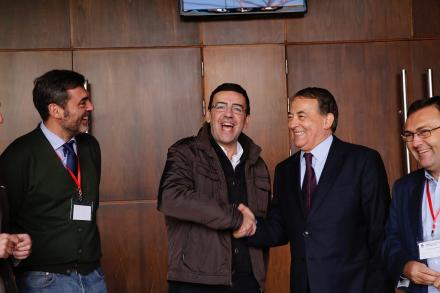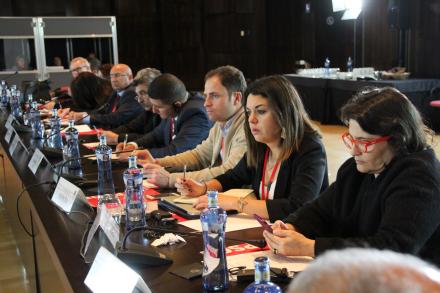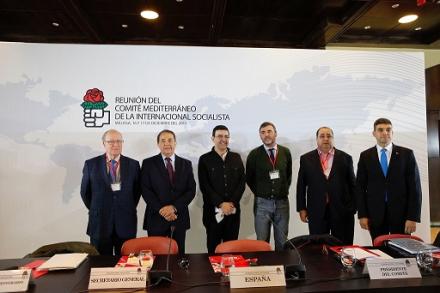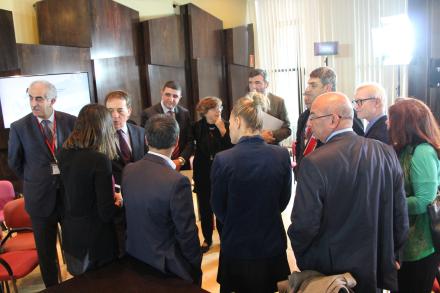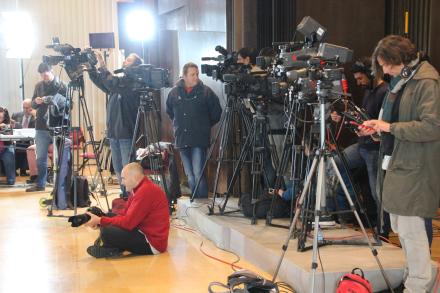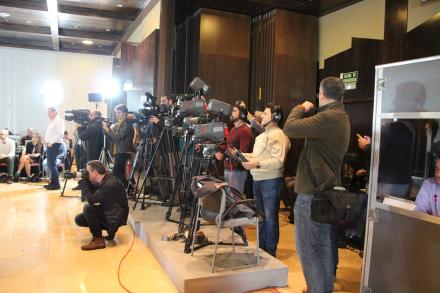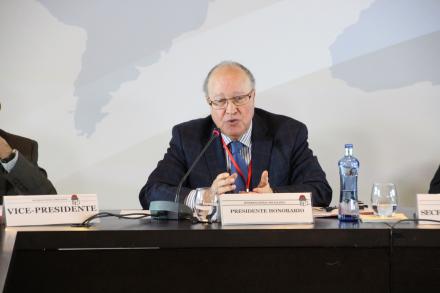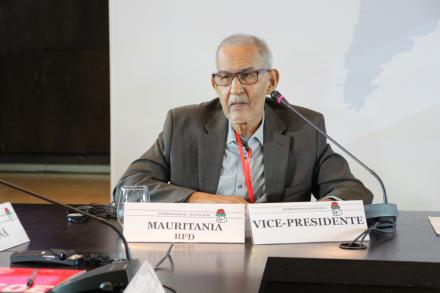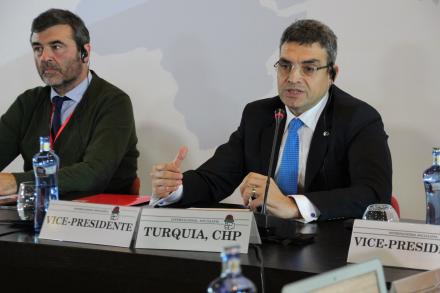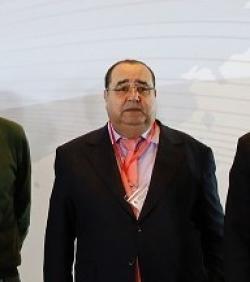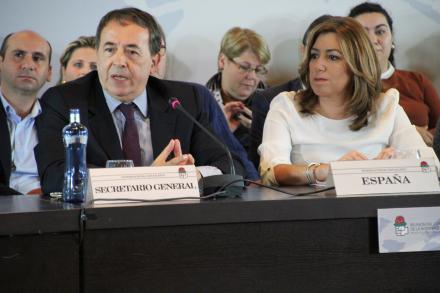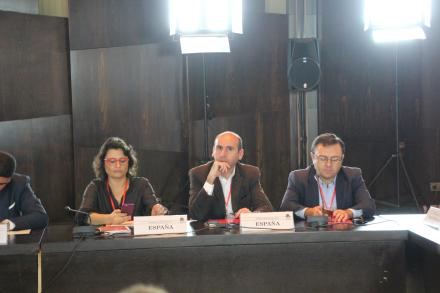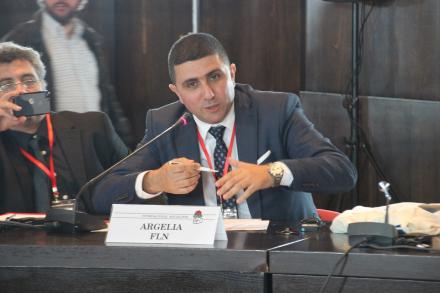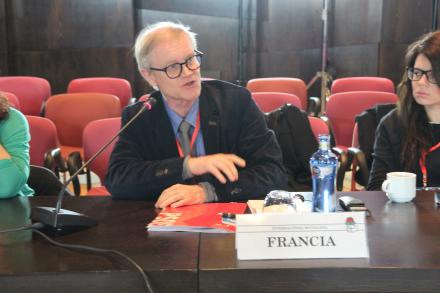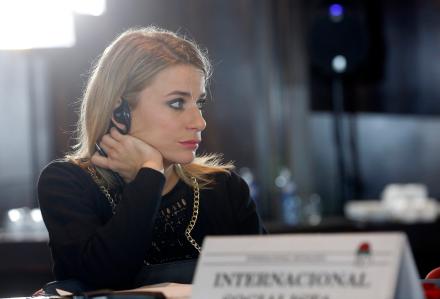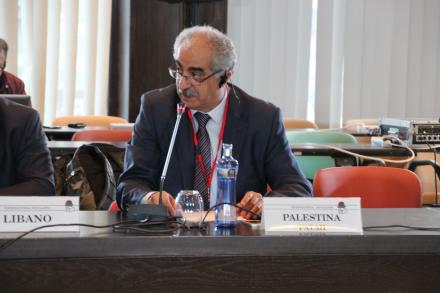Mediterranean
Meeting of the SI Mediterranean Committee
Málaga, Spain
16-17 December 2016
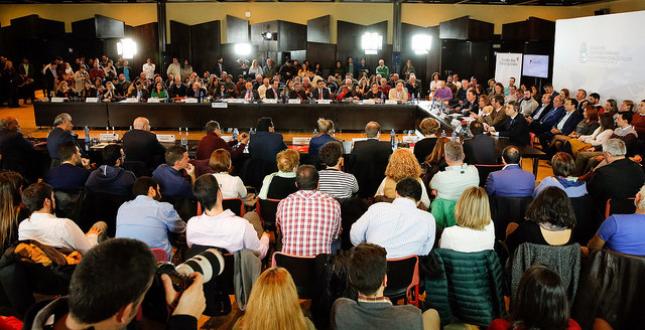
The Socialist International Mediterranean Committee held a meeting in Malaga on 16-17 December 2016, hosted by the Spanish Socialist Workers' Party (PSOE), focussing its discussions on “The current challenges to ensuring democracy, freedoms, rights, and peace in the Mediterranean” and “Strategies for reaffirming our vision and values in the Mediterranean region”. Participants in the debates included delegates from Algeria, Cyprus, France, Greece, Israel, Italy, Lebanon, Mauritania, Morocco, Montenegro, Palestine, Spain, Tunisia, Turkey, Western Sahara and Syria, who contributed different perspectives on these themes, reflecting the diversity and complexity of the region while at the same time the values and principles that unite us in the Socialist International.
In the opening session of the meeting participants were addressed by Mario Jiménez, Spokesperson of the governing commission of the PSOE and responsible for organisation, who extended a warm welcome to all participants; by the SI Secretary General Luis Ayala, and by Ricardo Cortés, member of the governing commission of the PSOE responsible for Foreign Affairs, who chaired the meeting.
Introductory speeches to the main themes were given by Mustapha Ben Jaafar from Ettakatol, Tunisia, an Honorary President of the SI, and by SI Vice-Presidents Ahmed Ould Daddah from the RFD Mauritania and Umut Oran of the CHP, Turkey.
A high priority in the discussions was given to developments in Syria, to the dire situation of the people of Aleppo, and the international community’s failure to prevent or mitigate the humanitarian disaster that continues to unfold. It was highlighted that while almost 5 million Syrian refugees had sought shelter in neighbouring countries, most of the European countries had failed to fulfil their commitments, quite apart from their moral and legal obligations. It was also observed that the strictness with which the austerity measures were applied by the EU, which did so much damage to the region as a whole, was not matched by the same strictness in regard to the agreed cuotas for migrants, noting at the same time that there was an evident need for the European Union to return to its founding values.
Six years on from the so-called Arab Spring, major setbacks in democracy and fundamental rights were observed in the countries affected, although Tunisia still offered a promising example.
The recent increase in terrorist attacks was a cause of grave concern, which all participants resoundingly condemned, and the need to tackle the causes of radicalism was underlined. Concern was also expressed over the loss of basic human rights resulting from security measures taken in a number of countries to counter terrorism.
Various conflicts affecting the region, both old and new, were discussed with parties directly concerned. In this regard, the Committee agreed on a series of proposals to achieve a fair Mediterranean Pax, which are outlined in the declaration subsequently adopted by the meeting.
Cause for optimism was seen in the situation of Cyprus where negotiations due to continue in January looked hopeful for providing a bi-zonal solution to that long-standing conflict and the committee was unanimous in its support for the process underway, which if successful would bring hope to others in the region as a good example of political coexistence in peace.
The agenda also included a discussion on the national situation in the different countries of the region, which offered the opportunity for participants to share information on the current realities in their respective countries, on work of their party, and the challenges ahead.
The Committee then adopted the Declaration: “A call for hope against resignation: For greater solidarity with refugees, towards the 'Mediterranean Pax’ ”, reflecting the key points of the discussion.
Following these debates, Ricardo Cortés inaugurated a special closing session in which the Committee was joined by Susana Díaz, President of the government of Andalucía and Secretary General of the PSOE-Andalucía. In her address, Susana Díaz pointed to the rich diversity of the peoples and countries that made up the Mediterranean basin and underlined the need for consolidating democracy, improving the economy and for the EU to coordinate a plan for migrants and refugees, particularly minors arriving without supervision. She stressed that we are not just socialists but also internationalists, and our strength lies in our values and ideas.
The SI Secretary General, Luis Ayala, touched on the key elements that dominated the discussions of the Committee and highlighted the crucial issues of Peace, Equality and Solidarity, which would form the basis of our discussions at the forthcoming SI Congress to be held in Cartagena, Colombia, in March 2017. He also looked forward to the taking office of the new Secretary General of the United Nations, António Guterres, a person we all identified with as socialists and who would have all our support in the complex work ahead of him.
For greater solidarity with refugees, towards the 'Mediterranean Pax'
This meeting is taking place at a critical time for countries on both shores, stressed by several crises that question our stability and future. This Committee is not only very concerned about the evolution of the various conflicts affecting our area, but also remains distressed by the European Union's self-absorption in recent months.
For this committee it has become self-evident that we can only address the problems in the Mediterranean by considering it as one single entity. We are completely interdependent, and firmly believe that peace, prosperity, democracy and equality will not be accomplished, without tackling problems together and from a shared vision.
The war in Syria shames us all. We recall with dismay that it is estimated that around 400,000 people have died in 6 years, that 6.6 million Syrians are internally displaced and almost 5 million have sought shelter in neighbouring countries such as Lebanon, Jordan, Iraq, Turkey and Egypt. In contrast, most countries in Europe have not even hosted the refugees that reached their shores after dangerous journeys aspiring to a safer and better life, failing to fulfil their own commitments, as well as their moral and legal obligations. For this reason we appreciate the efforts of those few European countries, like Italy and Greece, which have opened their doors to them.
On the other hand, five years after the so-called Arab Spring, it is obvious that those democratising processes that inspired the region with hope have not evolved as we would have wished. Far from it, we have noted with great concern major setbacks in human rights, civil liberties and the rule of law in several countries, not only on the southern coast of the Mediterranean, as is the case in Egypt, but also in countries such as Turkey.
Moreover, we are horrified by all the terrorist attacks that have taken place in the last years throughout the Mediterranean, from Istanbul to Paris, from Brussels and Cairo to Tunis. We express our outrage and condemn the recent terrorist strikes by PKK that hit Turkey in the last weeks, where dozens of innocent people have lost their lives. Our governments should confront these threats from a global perspective, not only fighting terrorists on the ground but also tackling the causes of radicalism.
We are aware how old problems in the region remain entrenched, as is the case of the Palestinian-Israeli conflict or the Western Sahara issue, although we await with hope that the negotiations on Cyprus will soon be concluded with success. We express solidarity with the member parties of the Socialist International in government in the Mediterranean countries of the South Eastern Europe, and welcome the new government in Montenegro.
In this context, the member parties of the Mediterranean Committee of the Socialist International propose the following conclusions and measures to advance the pacification of conflicts in the region and achieve a fair Mediterranean Pax, based on the principles of equality, justice and democracy:
- We ask the international community to stop the war in Syria and bring peace and stability to the country, thus allowing the refugees to return to their homes and begin the reconstruction of their homeland.
- We call for greater solidarity among the countries of the European Union to welcome the number of refugees previously agreed. Not only is it a commitment undertaken, it is also a moral obligation, in line with the founding values of the EU, as well as a legal imperative, in accordance with the Conventions on Human Rights.
- We condemn all terrorist attacks and show our deep support to all their victims. We call on all governments in the region for greater cooperation, to join forces and share resources and intelligence to fight the scourge of terrorism. In addition, we appreciate all those forces fighting terrorism on the ground.
- We are extremely concerned about the rise of populist and extreme right parties that inflame our societies with hate speeches and xenophobia. Social democratic forces around the world should unite to stop the emergence of these new actors, combating their simplistic responses to complex problems, as well as their intolerance, with a renewed discourse capable of putting forward an alternative to austerity policies that foster inequality and discontent in our societies.
- We condemn the attempted military coup in Turkey on July 15th, but also deeply regret the authoritarian and undemocratic shift of the Turkish Government since then. We express our strong support and solidarity to all the Turkish people, their civil society, their journalists and human rights defenders, and also to our colleagues in the CHP and the HDP, who are being repressed for defending democratic values and ideas.
- We welcome the French initiative to restore the peace process in the Middle East and we urge a return to the negotiating table, with full respect for International Law and United Nations resolutions, in order to achieve a just and lasting peace, based on the two-state solution, with the recognition of the State of Palestine on the basis of the 1967 borders, and ensuring that the State of Israel can live in peace and security.
- We call on Morocco and the Polisario Front to resume the process of dialogue on the question of Western Sahara in a constructive spirit under the auspices of the United Nations and the African Union, and we ask the UN Secretary-General for his personal involvement. We will continue to support a just and lasting political solution accepted by both sides that can bring stability and development to Western Sahara and the region as a whole.
- In the framework of the current negotiations between the Greek Cypriot and Turkish Cypriot leaders, who will meet in Geneva on the 9th of January 2017, we call on both sides of the island and all related parties to continue working to reach a bizonal, bicomunal federal solution for Cyprus as soon as possible. We cannot miss this important opportunity, we wish success to the International Conference on Cyprus that will take place on 12th January and we hope that the island of Cyprus will soon become an example of peaceful coexistence, cooperation and prosperity in the Eastern Mediterranean.
- We closely follow the consolidation of democratic processes in Tunisia, and we call on the international community to help this country to tackle the economic and social crisis which threatens the only successful example of the Arab Spring.
- We request the international community to deploy all its efforts to foster the internal dialogue in Libya in order to reach a political solution which would bring stability and security to the country and the whole region.
- We congratulate António Guterres, former President of the Socialist International, on his appointment as the new Secretary-General of the United Nations, and wish him success in his efforts to advance the solution of the serious problems affecting our region.
- We wish to emphasise the need to effectively support all sectors of the population that struggle, too often risking their lives, every day for more democracy, more freedom, more economic development and more equality between men and women. We want to keep alive the hopes and illusions of these groups, that are too often cornered by extremes.
Tackling all these challenges is our main task as Socialists and as members of this Committee. We must not give up. We must keep on fighting, day by day, shoulder to shoulder, so that this fragile, but at the same time unique area that is the Mediterranean, becomes more just, secure and prosperous for all.
Málaga, 17th December 2016
Other activities
-
Meeting of the SI Mediterranean Committee, Barcelona, Spain
26-27 October 2015
-
Meeting of the SI Mediterranean Committee
Valencia, Spain
13-14 February 2015
-
For progressive change, peace and stability in the Mediterranean
05 June 2012
-
Calling for ‘a single shore’, the SI Mediterranean Committee meets in Barcelona
05-06 October 2009
-
SI Mediterranean Committee meeting in LEBANON
25-26 April 2008
-
SI Mediterranean Committee meets in NAPLES
04-05 May 2007
-
SOCIALIST INTERNATIONAL discusses Lebanon situation in extraordinary meeting in Beirut
16 December 2006
-
Valencia meeting addresses key issues for the MEDITERRANEAN REGION
24-25 October 2005
-
Socialist International welcomes the outcome of Lebanese elections
20 June 2005
-
SOCIALIST INTERNATIONAL focuses attention on the situation in Lebanon at a special meeting
04 April 2005
-
SI Mediterranean Committee HOLDS MEETING IN LIMASSOL in support of negotiations for a united Cyprus
26-27 March 2004
-
Meeting of the SI Mediterranean Committee in Split, Croatia
10-11 October 2003
-
SI Mediterranean Committee meeting in Toledo, Spain
09-10 May 2003
-
Meeting of the Socialist International Mediterranean Committee, Seville
29-30 October 2001
-
Meeting of the Socialist International Mediterranean Committee, Palma de Mallorca
01-02 December 2000
-
Meeting of the Socialist International Mediterranean Committee, Paris
06 November 1999
-
Meeting of the Socialist International Mediterranean Committee, Rome
06-07 March 1998
-
Meeting of the Socialist International Mediterranean Committee, Tangier
21-22 March 1997
-
Images of SI observation of the Lebanese elections, June 2005
If you are looking for an earlier meeting, please consult the LIBRARY section.








